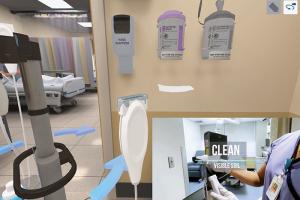Tech talk: Emergency medical drones and cutting-edge hospitals for kids
Playful design meets advanced technology in children’s hospital

The new hospital opened April 17 on the University of Kentucky HealthCare campus.
Shriners Hospital for Children in Lexington, Ky., combines playful design that appeals to children and advanced technology for efficient care. Throughout the facility, patients and families are greeted by murals of rainbows and baby animals, but also high-tech solutions such as a motion-analysis lab fitted with 12 digital video cameras that help to diagnose patient conditions. The lab also has pressure-sensitive floor plates to analyze how patients walk.
The hospital has two operating suites fitted with voice-activated equipment and an interactive video wall that young patients can play with to stay busy.
Drones bring emergency care to rural patients
Researchers in Sweden pitted drones against emergency medical services professionals to see which was the fastest method to deliver life-saving delivery to patients in cardiac arrest.
From 2006 to 2014, Swedish researchers used drones to deliver automated external defibrillators (AEDs) to cardiac arrest patients in rural areas 18 times. Each of those flights beat the time it took ambulances took to arrive at the scene, with an average time reduction of about 16 minutes. Meanwhile, it took EMS teams 3 minutes to assemble and dispatch to location, while drones were sent into flight within 3 seconds.
Results of the study were published in the Journal of the American Medical Association.
AEDs are critical to the survival rate of patients who experience a heart attack. According to the American Heart Association, the more time a person spends in cardiac arrest before being shocked with AED, the less chance they have of survival. The aim is to shock the patient within 3 minutes.
Children’s hospital upgrades infrastructure for new patient tower

Dr. John Ragheb, Dr. Toba Niazi and Dr. Sanjiv Bhatia, Neursurgeons at Nicklaus Children’s Hospital, pose in front of the hospital’s new Intraoperative MRI
Nicklaus Children’s Hospital, Miami, has finished moving patients into its six-story Advanced Pediatric Care Pavilion. The new bed tower houses three general intensive care units, one for neurology-neurosurgery and one for cardiac care.
It is also home to a number of advanced technologies designed to enhance patient care and experience. For instance, an interoperative MRI attached to a ceiling-mounted rail system moves from Point A to Point B during neurosurgical procedures, eliminating the need to move patients who are in such a vulnerable state.
Other infrastructure improvements include the tower’s pneumatic tube system that speeds the transport of medications and lab specimens; and electronic touch-screen panel signs located outside of patient rooms to convey important messages to the care team, such as isolation precautions.
Get an inside look of the facility via the video below




